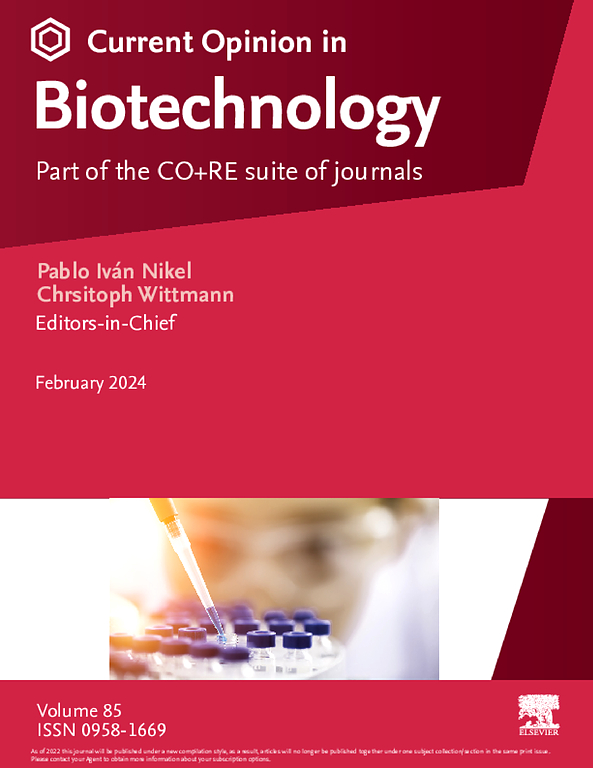Adaptive laboratory evolution for improving acetogen gas fermentation
IF 7.1
2区 工程技术
Q1 BIOCHEMICAL RESEARCH METHODS
引用次数: 0
Abstract
Gas fermentation using acetogens can help humankind transition from petroleum-based industries to more sustainable alternatives. Acetogens are a unique set of organisms that efficiently convert carbon oxide waste gases into chemicals, such as ethanol and acetate. While acetogens are already used in commercially operated bioprocess facilities, the field is still affected by challenging genetic manipulation workflows and a developing knowledge of acetogen metabolism. Adaptive laboratory evolution (ALE) can uniquely contribute here, through evolution of organisms guided by synthetically created niches, which delivers strains with industrially relevant phenotypes and helps to resolve genotype–phenotype relationships. Here, we review the expanding use of ALE for acetogens, showcasing results regarding fundamental understanding of acetogens and improvement of phenotypes — faster growth/substrate utilisation, elimination of media components, improving stress tolerance, and improving growth and robustness in bioreactor cultures. These works provide the field with opportunities to further engineer and manipulate acetogen traits for industrial bioprocesses and improve the understanding of genotype–phenotype relationships.
改进乙炔气体发酵的适应性实验室进化
使用氧气的气体发酵可以帮助人类从以石油为基础的工业过渡到更可持续的替代品。Acetogens是一组独特的生物,可以有效地将二氧化碳废气转化为化学物质,如乙醇和醋酸盐。虽然在商业化操作的生物工艺设施中已经使用了氧气,但该领域仍然受到具有挑战性的遗传操作工作流程和不断发展的氧气代谢知识的影响。适应性实验室进化(ALE)可以在这里做出独特的贡献,通过合成创造的生态位引导生物体的进化,提供具有工业相关表型的菌株,并有助于解决基因型-表型关系。在这里,我们回顾了ALE在发酵菌中的广泛应用,展示了对发酵菌的基本理解和表型改善的结果——更快的生长/底物利用,消除培养基成分,提高抗逆性,提高生物反应器培养物的生长和稳健性。这些工作为该领域提供了进一步设计和操纵工业生物过程中的醋酸性状的机会,并提高了对基因型-表型关系的理解。
本文章由计算机程序翻译,如有差异,请以英文原文为准。
求助全文
约1分钟内获得全文
求助全文
来源期刊

Current opinion in biotechnology
工程技术-生化研究方法
CiteScore
16.20
自引率
2.60%
发文量
226
审稿时长
4-8 weeks
期刊介绍:
Current Opinion in Biotechnology (COBIOT) is renowned for publishing authoritative, comprehensive, and systematic reviews. By offering clear and readable syntheses of current advances in biotechnology, COBIOT assists specialists in staying updated on the latest developments in the field. Expert authors annotate the most noteworthy papers from the vast array of information available today, providing readers with valuable insights and saving them time.
As part of the Current Opinion and Research (CO+RE) suite of journals, COBIOT is accompanied by the open-access primary research journal, Current Research in Biotechnology (CRBIOT). Leveraging the editorial excellence, high impact, and global reach of the Current Opinion legacy, CO+RE journals ensure they are widely read resources integral to scientists' workflows.
COBIOT is organized into themed sections, each reviewed once a year. These themes cover various areas of biotechnology, including analytical biotechnology, plant biotechnology, food biotechnology, energy biotechnology, environmental biotechnology, systems biology, nanobiotechnology, tissue, cell, and pathway engineering, chemical biotechnology, and pharmaceutical biotechnology.
 求助内容:
求助内容: 应助结果提醒方式:
应助结果提醒方式:


